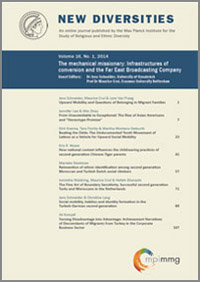The Fine Art of Boundary Sensitivity. Successful Second Generation Turks and Moroccans in the Netherlands
by Ismintha Waldring (Erasmus University Rotterdam), Maurice Crul (Erasmus University Rotterdam) and Halleh Ghorashi (Free University of Amsterdam)
To cite this article: Waldring, I., Crul, M., & Ghorashi, H. (2014). The Fine Art of Boundary Sensitivity. Successful Second Generation Turks and Moroccans in the Netherlands. New Diversities, 16(1), 71–87. https://doi.org/10.58002/zt1n-p467
This article investigates in what ways the highly educated second generation of Turkish and Moroccan descent in the Netherlands deal with the increasingly impermeable, bright boundaries in various fields in Dutch society, including the labour market. We find evidence that these individuals employ a strategy of sameness and difference throughout their careers to deal with societal and work-related boundaries. Their emphasis on professional sameness opens up ways to relate to and instil confidence among colleagues with a background of native parentage. They avoid giving up parts of their identity through assimilation by keeping their differences in place where it matters most to them. This juggling of sameness and difference seems to be an individual and situational balancing act, based on an awareness that boundaries exist, and a sensitivity towards dealing with them.
Keywords: second generation, professionals, labour market, social boundaries, sameness/difference
|
